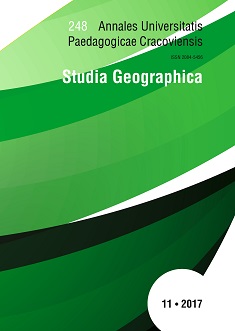Clusters and their role in cooperative creation of tourism products
Keywords:
clusters, tourism destinations, collaborationAbstract
The paper presents the idea of destination product and describes the necessity its collaborative creation. One of methods of such a collaborative creation of a destination product is using the cluster concept. The paper discuss evolution of the notion of cluster as well as its consequences for using it in tourism industry. Tourism clusters are not typical clusters and have few typical features presented in the paper. Finally, the paper reveals relations between creation and operations of tourism clusters and other forms of institutionalization of intra- destination cooperation like local and regional tourism organizations and local action groups.References
Altkorn, J. (1995). Marketing w turystyce. Warszawa: PWN.
Brezovec, T., Brezovec, A. (2004). Tourism organisations at local level: partners or competitors? International Conference Strategic Partnership for the Development of Tourist Destinations, 18–19 March 2004, Portorož, Slovenia.
Czernek, K. (2013). Organizacje partnerskie na jednym obszarze turystycznym – problemy i wyzwania. Ruch Prawniczy, Ekonomiczny i Socjologiczny, 75(2), 201–216.
Da Cunha, S.K.D., da Cunha, J.C.D. (2005). Tourism cluster competitiveness and sustainability: proposal for a systemic model to measure the impact of tourism on local development. Brazilian Administration Review, 2(2), 47–62.
Dziedzic, E. (1998). Obszar recepcji obszar recepcji turystycznej jako przedmiot zarządzania strategicznego. Warszawa: SGH.
Gołembski, G. (1998). Przedsiębiorstwo turystyczne w gospodarce wolnorynkowej. Poznań: Wydawnictwo Akademii Ekonomicznej w Poznaniu.
Hall, D.R. (1998). Tourism development and sustainability issues in Central and South-Eastern Europe. Tourism Management, 19(5), 423–431.
Hawkins, D.E. (2004). A protected areas ecotourism competitive cluster approach to catalyse biodiversity conservation and economic growth in Bulgaria. Journal of Sustainable Tourism, 12(3), 219–244.
Holloway, Ch, Robinson, Ch. (1997). Marketing w turystyce. Warszawa: PWE.
Hołderna-Mielcarek, B. (1998) Regionalizacja produktu turystycznego. Rynek Turystyczny, 12, 10–11.
Jackson, J., & Murphy, P. (2006). Clusters in regional tourism An Australian case. Annals of Tourism Research, 33(4), 1018–1035.
Januszewska, M., Nawrocka, E. (2008). Pobudzanie przedsiębiorczości lokalnej i innowacyjności a konkurencyjność obszarów recepcji turystycznej. W: G. Gołembski (red.), Turystyka jako czynnik wzrostu konkurencyjności regionów w dobie globalizacji. Poznań: Wydawnictwo Akademii Ekonomicznej w Poznaniu, 281–292.
Jedlińska, M., Szubert-Zarzeczny, U. (1992). Gospodarka turystyczna. Wrocław: Wydawnictwo Akademii Ekonomicznej we Wrocławiu.
Kachniewska, M. (2013). Towards the definition of a tourism cluster. Journal of Entrepreneurship Management and Innovation, 9(1), 33–56.
Kachniewska, M. (2014). Polaryzacja podaży turystycznej jako stymulanta rozwoju sieciowych produktów turystycznych. Ekonomiczne Problemy Turystyki, 25, 27–42.
Kaczmarek, J., Stasiak, A., Włodarczyk, B. (2008). Przestrzeń gościnna – kilka uwag o konkurencyjności regionów. W: G. Gołembski (red.), Turystyka jako czynnik wzrostu konkurencyjności regionów w dobie globalizacji. Poznań: Wydawnictwo Akademii Ekonomicznej w Poznaniu, 145–152.
Langer, W. (2001). Zarządzanie marketingowe miastem. W: A. Klasik, F. Kuźnik (red.), Zarządzanie strategiczne rozwojem lokalnym i regionalnym. Katowice: Wydawnictwo Akademii Ekonomicznej w Katowicach, 126–148.
Medlik, S. (1995). Leksykon podróży, turystyki, hotelarstwa. Warszawa: PWN.
Middleton, V.T.C. (1996). Marketing w turystyce. Warszawa: PAPT.
Migdal, M. (2013). Poradnik. Lokalna Organizacja Turystyczna. Szczecin: Forum Turystyki Regionów.
Niedzielski, P., Dołowy, A., Milewski, D., Szostak, D. (2008). Innowacyjność i struktury klastrowe w województwie zachodniopomorskim. Turystyka. Szczecin: Wydawnictwo Naukowe Uniwersytetu Szczecińskiego w Szczecinie.
Nordin, S. (2003). Tourism clustering & innovation – path to economic growth & development. Östersund: ETOUR.
Oliver, T., Jenkins, T. (2005). Integrated tourism in Europe’s rural destinations. W: E. Jones, C. Haven-Tang (red.). Tourism SMEs, service quality and destination competitiveness. Wallingford: CABI Publishing.
Panasiuk, A. (2006). Współpraca samorządu terytorialnego i przedsiębiorstw turystycznych – zagadnienia instytucjonalne. W: A. Rapacz (red.), Gospodarka turystyczna w regionie. Przedsiębiorstwo. Samorząd. Współpraca. Jelenia Góra: Wydawnictwo Akademii Ekonomicznej we Wrocławiu, 95–103.
Porter, M.E. (2001). M.E. Porter o Konkurencji. Warszawa: PWE
Rapacz, A. (2008). Rola klastrów w kształtowaniu struktury i jakości produktu turystycznego regionu. Gospodarka a Środowisko, 10, 110–118.
Rapacz, A., Gryszel, P., Jaremen, D. (2010). Klaster turystyczny jako forma kooperacji w obszarze recepcji turystycznej. W: J. Sala (red.), Konkurencyjność miast i regionów na globalnym rynku turystycznym. Warszawa: PWN, 706–721.
Roberts, L., Simpson, F. (1999). Developing partnership approaches to tourism in Central and Eastern Europe. Journal of Sustainable Tourism, 7(3–4), 302–317.
Simpson, K., Bretherton, P. (2004). Co-operative business practices in the competitive leisure destination: lessons from the wine tourism industry in New Zealand. Managing Leisure, 9(2), 110–126.
Stasiak, A. (2005). Obszar jako produkt turystyczny. W: K. Pieńkos (red.), Konkurencyjność polskiego produktu turystycznego. Warszawa: Wydawnictwo Wyższej Szkoły Ekonomicznej w Warszawie, 92–99.
Staszewska, J. (2009). Klaster jako perspektywa dla przedsiębiorców na polskim rynku turystycznym. Warszawa: Difin.
Szostak, D. (2006). Klaster jako narzędzie podnoszenia konkurencyjności i innowacyjności regionalnej gospodarki turystycznej. W: A. Rapacz (red.), Gospodarka turystyczna w regionie. Przedsiębiorstwo. Samorząd. Współpraca. Jelenia Góra: Wydawnictwo Akademii Ekonomicznej we Wrocławiu, 428–437.
Weiermair, K., Steinhauser, C. (2003). New tourism clusters in the field of sports and health: The case of Alpine wellness. Paper presented at 12th International Tourism and Leisure Symposium, Barcelona, April 2003.
Zmyślony, P. (2008). Partnerstwo i przywództwo w regionie turystycznym. Poznań: Wydawnictwo Akademii Ekonomicznej w Poznaniu.
Żabińska, T. (2007). Sieci partnerskie jako podstawa zrównoważonego rozwoju turystyki w regionie – kluczowe czynniku sukcesu. W: J. Wyrzykowski (red.), Rola turystyki w gospodarce regionu. Wrocław: Wydawnictwo Wyższej Szkoły Handlowej we Wrocławiu, 11–17.
Żemła, M. (2008). Failures in building partnership for success in the competitive market. The case of Polish ski resorts. Managing Global Transitions, 6(4), 256–270.
Downloads
Published
Issue
Section
License
The submission of a paper to be published is synonymous with an agreement to transfer the copyright free of charge from the author to the publisher. The author also agrees to permit the publisher to publish the paper in printed form, open access online form, digital library form and other digital platforms with which the publisher has or will have a publishing agreement. Furthermore, the author agrees to not limit the number of copies that may be printed or issued by the publisher. In the case of co-authored papers, it is assumed that the corresponding author is authorized to represent the remaining co-authors in this respect. Authors are requested to sign a copyright declaration.

